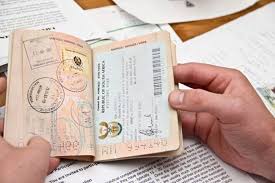HARARE – Finance minister Mthuli Ncube announced a Z$59.5 trillion budget for 2024 on Thursday, raising the price of services and attempting to widen the tax base to shore up the government’s finances.
The main opposition labelled his budget “anti-people” after he increased toll gate fees by 150 percent and also nearly doubled the cost of a passport.
Ncube maintained that his budget “seeks to consolidate and entrench the stability to facilitate economic transformation and preserve disposable incomes.”
The budget would be financed through projected Z$51.2 trillion tax revenues and Z$2.7 trillion non-tax revenue. The 2023 budget was Z$4.2 trillion.
“The fiscal policy thrust for the 2024 national budget is guided by the need to maintain a sustainable budget deficit within the SADC macroeconomic convergence threshold of not more than 3 percentof GDP. Fiscal restraint and tight monetary policy, together with a healthy current account position, provides the necessary conditions for currency and price stability,” he said.
Ncube said the budget for 2024 gives priority to infrastructure spending, government wages and preserving disposable incomes.
“The total budget financing gap amounts to Z$9.2 trillion, comprising a budget deficit of Z$4.3 trillion (1.5 percent of GDP) and amortisation of loans and maturing government securities estimated at Z$4.9 trillion. The deficit will be financed through domestic and external borrowing,” he said.
He said ministries, government departments and agencies submitted funding bids of over Z$110 trillion, against the available envelope of Z$58.2 trillion.
Ncube gave the highest budget allocation to the security services followed by education and health, in what the main opposition Citizens Coalition for Change said showed that the government “values guns more than equipping hospitals, improving schools or feeding the nation.”
“Security forces play an important role of protecting the country’s territorial integrity, national interest and sovereignty over land and air space, against both internal and external aggression,” Ncube said as he allocated the sector Z$8.6 trillion which he said was for their remuneration, food rations, operational equipment and infrastructure maintenance.
Ncube said the 2024 budget prioritises provision of quality and easy access to education and other learning opportunities for children .
“In this regard, Z$8 trillion has been set aside for the Ministry of Primary and Secondary Education for teaching and learning materials, as well as teacher capacitation at primary and secondary education level. This includes resources for the procurement of sanitary wear for disadvantaged girls,” he said.
Z$6.3 trillion will go to the Ministry of Health and Child Care for “the provision of the requisite tools of trade such as adequate working space, manpower, drugs and medical supplies across the value chain.”
The Ministry of Lands, Agriculture, Fisheries, Water and Rural Development received Z$4.3 trillion.
Ncube said economic growth is expected to slow down to 3.5 percent in 2024, mainly owing to the anticipated impact of the El-Nino phenomenon being forecasted for the 2023/24 summer cropping season on agricultural output, as well as declining mineral commodity prices attributable to the global economic slowdown.
“The domestic economy is now projected to grow by 5.5 percent in 2023, a slight upward revision from the August projection of 5.3 percent, on account of better-than-expected output in agriculture, in particular, tobacco, wheat and cotton,” he told MPs.
“The positive growth of 3.5 percent in 2024 will be driven by mining (+7.6 percent) and accommodation and food services (+6.9 percent), while the agriculture sector is projected to contract by (-4.9 percent).”
Ncube said in order to raise resources to finance road infrastructure, he proposed an upwards review of the Strategic Reserve Levy by US$0.03 and US$0.05 per litre of diesel and petrol, respectively, with effect from January 1, 2024.
The minister announced shock increases in road tolls, vehicle registration and passport fees.
A return trip from Harare to Bulawayo will see a motorist driving a family sedan pay US$50 at tollgates after he increased toll fees from US$2 to US$5 on the major highways – Harare-Beitbridge Road and Plumtree-Harare-Mutare Road. Tolls on other roads will cost US$4.
“Additional revenue generated from the above measures will be ring-fenced towards road infrastructure development,” he said.
An ordinary passport currently costing US$120 goes up to US$200, and registering a family sedan will now cost US$100 from US$80.
“Revenue derived from the increased fees will be remitted to the Consolidated Revenue Fund,” Ncube said.
Ncube introduced a levy of US$0.02 per gram of sugar contained in beverages, excluding water, with effect from January 1, 2024. He said funds from this levy will be ring-fenced for therapy and procurement of cancer equipment.
Home owners whose properties have a value of US$100,000 or more must pay a “wealth tax” equal to 1 percent of the value of their property.
“Resources derived from the levy will be ring-fenced towards urban infrastructure development, in particular roads, water, sewer and community health centres. Principal private residential properties owned by elderly persons above 70 years will, however, be exempt from the tax,” he said.
He said Zimbabwe exported goods worth US$5.2 billion in the first nine months of the year. Exports are expected to end the year at US$7.3 billion, up from US$7 billion in 2022. This was due to higher exports of tobacco, lithium, and diamonds.
The government will convert the current US$300 Covid-19 and “cushioning” allowances that civil servants are getting into pensionable salaries, starting January, Ncube said.
The tax free pay threshold is now Z$750,000, but critics said that was almost the equivalent of US$100 and does not cover most workers.
Ncube said ZIMRA would be empowered to go to banks and security companies which hold safety deposit boxes for companies and individuals and inspect the contents in a push to force owners to pay taxes and use the banking system.
“Mthuli Ncube’s punitive taxes leave no person and no place behind. The only thing left is to tax babies for being born. The entire budget is anti-people, anti-investment, anti-growth and anti-productivity. They’ve destroyed the economy and now want to take it out on the people. It’s a mess,” CCC MP Fadzayi Mahere said.
“The budget was presented in our unstable Zimbabwe dollar notwithstanding that the economy has largely dollarised meaning that it’s a tabulation of figures that will be meaningless by the end of 2024 when these amounts are eroded by inflation.”
Economist Tinashe Murapata said Ncube’s budget showed that the government was “desperate” to raise money.
“Why is Ncube scrounging around for revenue in a purportedly growing economy? All these taxes have been tried elsewhere and only result in a parallel or as they say black market. They accelerate the informalisation of the economy and punish those that are law abiding,” Murapata said.
“Treasury is desperate. In their desperation they’ve increased avenues for corruption. When the Intermediated money transfer tax (IMTT) was introduced, it was 11 percent of revenue. It’s now 5.4 percent and falling. How? The market is now using cash dollars.”
Source ZimLive










